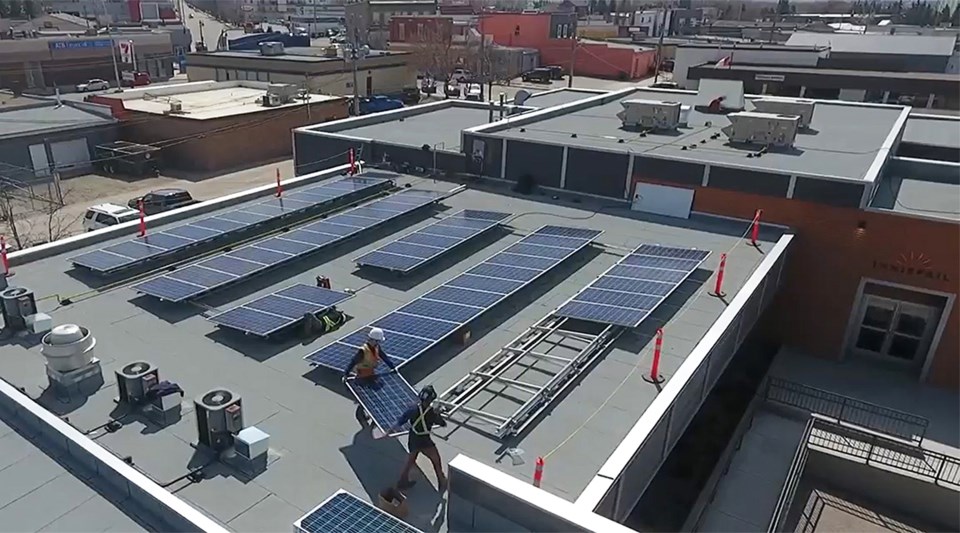INNISFAIL – The Town of Innisfail is retaining the services of a Calgary-based company to market carbon credits earned from recent solar panel installations on municipal buildings that will potentially bring in revenues of up to $10,000 annually for the next 10 years.
And there are even bigger carbon credit revenues on the way.
The planned Municipal Solar Farm, which is already expected to generate $600,000 annual revenues after it’s built in late 2024, is expected to generate another $100,000 a year through the marketing of its generated carbon credits.
Meghan Jenkins, the town’s director of community services, made a presentation to town council at its regular meeting on Feb. 12 on how the town could secure substantial financial benefits from carbon credits over the next decade.
Her report to council included a recommended motion to direct administration to enter into a 10-year working agreement with Calgary-based Solar Offset for the creation of carbon credits from distributed solar generation under the Alberta TIER Offset system.
The motion was unanimously approved by town council.
“I just absolutely love this. I think it's a reflection of the sophistication that the Town of Innisfail has, and the ability and knowledge that our senior leadership team has,” said Mayor Jean Barclay. “A couple of years ago we set out to increase the energy IQ of the organization, including council. I'm pleased to see this work and report come.”
Jenkins reminded town council at its regular meeting on Feb. 12 that the town installed more than 200 kilowatts of solar energy power in 2022 - an investment of just under $400,000 - at the town’s fire hall, administration building and curling rink.
Council was told carbon offset credits for this generation can be validated and marketed through the Alberta Technology Innovation and Emissions Reduction System (TIER).
She added the offsets are then purchased by large carbon emitters to meet compliance regulatory requirements through the market-based, variable price TIER system.
Jenkins said the town is able to market these credits because the municipality didn't receive any grant funding for the solar power installation in 2022.
“Typically, if you receive grant funding, like through the province and its Municipal Climate Change Action Centre (MCCAC) program, you're not able to monetize those carbon credits,” she said.
Jenkins told council the town sought the services of a qualified carbon credit company to market the municipality’s carbon credits.
She said the town received quotes from three carbon credit companies that would quantify, validate and market the credits on a commission basis.
Jenkins said Calgary-based Solar Offset was selected for a 10-year term with a 25 per cent commission rate.
She said Solar Offset will be tasked to examine the town’s recently installed solar panels and then its municipal power bills showing how much power was generated, which is then quantified into carbon offset amounts.
“They (Solar Offset) document that the solar panels actually exist, and that they're actually producing the energy they claim to do. It's sort of a quality control process,” said Jenkins. “Large emitters are then able to basically purchase those credits to offset their emissions.”
The agreement will include all currently installed generation with the exception of the 19-kilowatt solar panels installed at the administration building in 2018. That installation received funding from the provincial MCCAC program.
After Solar Offset’s work is completed and successfully marketed through the TIER system, Jenkins estimates the town could receive between $7,000 and 10,000 annually for each of the next 10 years.
And once the Municipal Solar Farm is built and becomes operational in the new Southwest Industrial Park, the town could see another $100,000 annually coming into its coffers.
“The solar farm is essentially going to be 10 times the size,” said Jenkins.



